Wanneer idealen botsen met de realiteit, gaat de strijd niet altijd om het verslaan van de vijand – het gaat erom het systeem uit te dagen dat de strijd mogelijk maakt.
When ideals clash with reality, the battle isn’t always about defeating the enemy—it’s about challenging the system that allows the fight to exist.
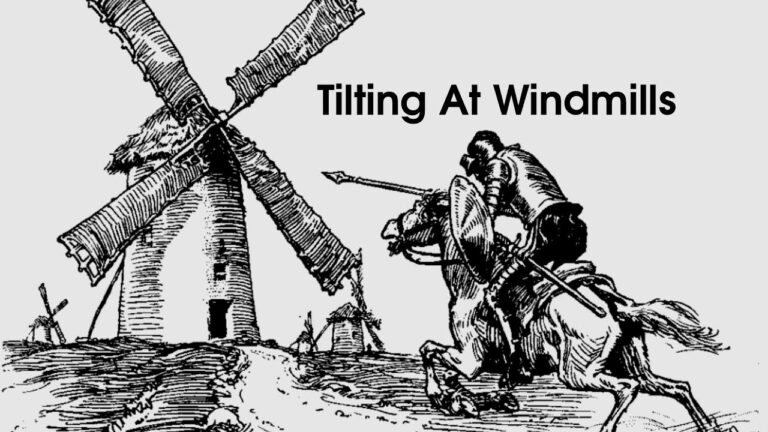
Chasing shadows and tilting at windmills—sometimes, the fight is less about winning and more about standing for what’s right, even against overwhelming odds.
Schaduwen achterna jagen en tegen windmolens vechten – soms gaat de strijd niet om winnen, maar om op te komen voor wat juist is, zelfs tegen overweldigende tegenstand.
Page description
Fighting windmills’ from Don Quixote means engaging in hopeless or imaginary battles against nonexistent enemies, symbolizing futile efforts.
1 When the Battle Chooses You
The phrase fighting windmills comes from Don Quixote, where the deluded knight mistakes windmills for giants and charges at them, believing he is on a noble quest. Over time, it has come to symbolize battling imaginary enemies or engaging in futile struggles.
But what if some “windmills” are real? What if institutions, armed with power and authority, disguise injustices as mere illusions – dismissing those who challenge them as misguided dreamers?
This page explores battles that seem unwinnable, where individuals stand against overwhelming forces, refusing to surrender to deception or silence. Whether it’s exposing institutional wrongdoing, confronting systemic failures, or challenging deeply entrenched myths, Fighting Windmills is about those who dare to tilt at giants—real or imagined.
Wanneer de Strijd Jou Kiest
De uitdrukking vechten tegen windmolens komt uit Don Quichot, waar de verwarde ridder windmolens aanziet voor reuzen en hen aanvalt, in de overtuiging dat hij een nobele missie vervult. In de loop der tijd is het een symbool geworden voor het bestrijden van ingebeelde vijanden of het voeren van zinloze gevechten.
Maar wat als sommige “windmolens” echt zijn? Wat als instituties, gewapend met macht en autoriteit, onrecht verhullen als illusies – en degenen die hen uitdagen afdoen als misleide dromers?
Deze pagina onderzoekt schijnbaar onbegonnen gevechten, waarin individuen de confrontatie aangaan met overweldigende krachten en weigeren te buigen voor misleiding of stilte. Of het nu gaat om het blootleggen van institutioneel wangedrag, het bestrijden van systeemfouten of het uitdagen van diepgewortelde mythes, Vechten tegen Windmolens gaat over degenen die de moed hebben om het op te nemen tegen reuzen – echte of ingebeelde.
2 Chasing Windmills
Chasing Windmills: Understanding an English Idiomatic Expression
7 feb 2024
Chasing Windmills: Unraveling an English Idiomatic Expression • Discover the meaning and origin behind the intriguing English idiomatic expression ‘Chasing Windmills’ in this enlightening video. Dive into the fascinating world of idioms and enhance your language skills!
00:00 • Introduction – Chasing Windmills: Understanding an English Idiomatic Expression
00:36 • The Origin of “Chasing Windmills”
01:14 • The Meaning and Usage of “Chasing Windmills”
02:03 • Examples in Everyday Conversation
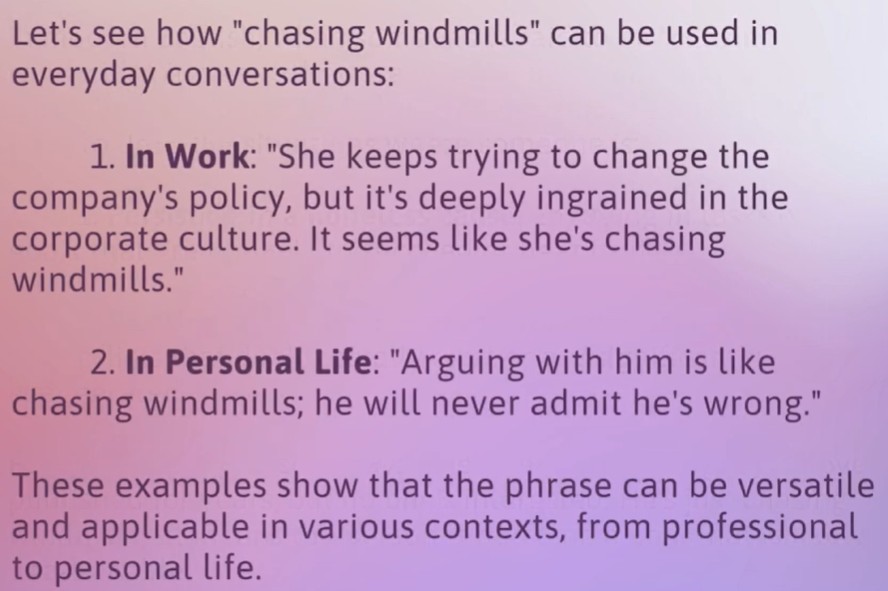
“Tilting at windmills is an English idiom that means “attacking imaginary enemies”.
The expression is derived from Don Quixote, and the word “tilt” in this context refers to jousting.
This phrase is sometimes also expressed as
“Charging at windmills” or “Fighting the windmills”.
The phrase is sometimes used to describe either confrontations where adversaries are incorrectly perceived, or courses of action that are based on misinterpreted or misapplied heroic, romantic, or idealistic justifications.
It may also connote an inopportune, unfounded, and vain effort against adversaries real or imagined.
The phrase “fighting windmills” comes from Don Quixote, and while the story is fictional, it’s become iconic because of the way it highlights a universal human experience: the idea of pursuing a cause or battle that seems noble, but in reality is misguided or futile.
The novel itself, written by Miguel de Cervantes, is often seen as both a parody of chivalric ideals and a commentary on human nature—about people who sometimes struggle against things that are not as they seem. Don Quixote, the protagonist, genuinely believes he is on a heroic quest, and this self-delusion is what makes the story both humorous and tragic.
Despite the story being fictional, the expression resonated with readers because it addresses something deeply human: the tendency to fight against perceived wrongs or dangers that are not really there or that can’t be overcome. It taps into our desire to do the right thing, even when it seems hopeless or misguided. Over time, the phrase “fighting windmills” has been used to refer to battles with imaginary foes, a sense of hopeless struggle, or even just the pursuit of lofty ideals that are disconnected from reality.
The combination of its literary origin and its philosophical undercurrent helped it become a widely recognized metaphor, which is why it has endured and remains relevant to this day.
“Het gevecht tegen windmolens” is een uitdrukking die betekent “het aanvallen van denkbeeldige vijanden”.
De uitdrukking is afgeleid van Don Quixote, en het woord “tilt” in deze context verwijst naar steekspelen.
Deze frase wordt soms ook uitgedrukt als
“Op windmolens afstormen” of “Vechten tegen de windmolens”
Deze uitdrukking wordt soms gebruikt om confrontaties te beschrijven waarbij tegenstanders verkeerd worden waargenomen, of acties die gebaseerd zijn op verkeerd geïnterpreteerde of misplaatste heroïsche, romantische of idealistische rechtvaardigingen.
Het kan ook duiden op een ongelegen, ongegronde en vergeefse inspanning tegen tegenstanders, echt of ingebeeld.
De uitdrukking “vechten tegen windmolens” komt uit Don Quichot, en hoewel het verhaal fictief is, is het iconisch geworden vanwege de manier waarop het een universele menselijke ervaring belicht: het idee om een zaak of strijd te voeren die nobel lijkt, maar in werkelijkheid verkeerd of vruchteloos is.
Het boek zelf, geschreven door Miguel de Cervantes, wordt vaak gezien als een parodie op ridderidealen en een commentaar op de menselijke natuur—over mensen die soms strijden tegen dingen die niet zijn wat ze lijken. Don Quichot, de hoofdpersoon, gelooft oprecht dat hij op een heldhaftige zoektocht is, en deze zelfmisleiding is wat het verhaal zowel humoristisch als tragisch maakt.
Hoewel het verhaal fictief is, resoneerde de uitdrukking met lezers omdat het iets dieps menselijks aanraakt: de neiging om te vechten tegen waargenomen onrecht of gevaren die er in werkelijkheid niet zijn of die niet overwonnen kunnen worden. Het raakt aan onze wens om het juiste te doen, zelfs als het hopeloos of verkeerd lijkt. Door de tijd heen is de uitdrukking “vechten tegen windmolens” gebruikt om te verwijzen naar gevechten met denkbeeldige vijanden, een gevoel van hopeloze strijd, of zelfs de zoektocht naar loftiest idealen die losstaan van de werkelijkheid.
De combinatie van de literaire oorsprong en de filosofische ondertoon heeft ervoor gezorgd dat het een veelgebruikte metafoor is geworden, wat verklaart waarom het zo goed bekend is gebleven.
3 Pursue Wild Geese or Chase Rainbows
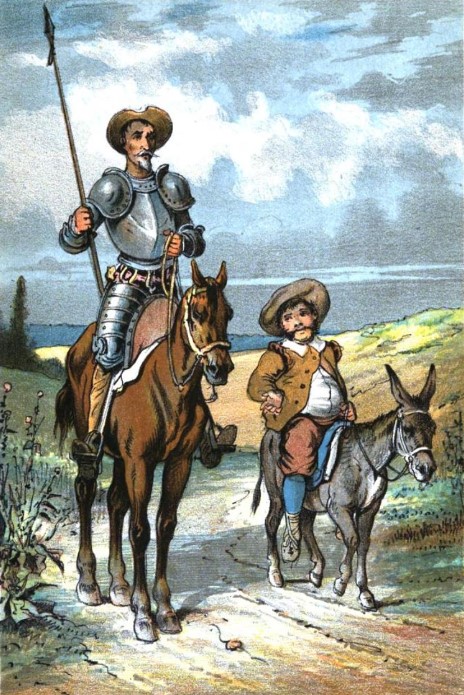
Don Quixote and his squire Sancho Panza
Tilt at windmills
Idiom literary
To fight enemies who do not really exist
“Tilting at windmills” is a literary English idiom that means attacking imaginary enemies.
The expression is derived from the 1605 novel Don Quixote by Miguel de Cervantes, and the word “tilt” in this context comes from jousting or tilting: A combat or encounter (for exercise or sport) between two armed men on horseback, with lances or similar weapons, the aim of each being to throw his opponent from the saddle (OED).
Related idioms include going on a wild goose chase and chasing rainbows. All three phrases make the point that an objective is illusory, impractical, or impossible. As such, people who tilt at windmills, pursue wild geese or chase rainbows are frequently said to be ‘off/away with the fairies’ and ‘in a world of their own’!
Is “fight windmills” idiom common in modern spoken English?
Is “fight windmills” ( In meaning of fighting imaginary enemies) idiom common in modern spoken English? And what is the modern equivalent for the idiom if not.
The expression “Pursue wild geese or chase rainbows” suggests the idea of pursuing impractical or unattainable goals. It implies chasing after things that may be elusive or unrealistic.
“Fighting windmills” is an idiom derived from the classic novel “Don Quixote” by Miguel de Cervantes. It means engaging in a hopeless or imaginary battle, often against powerful or insurmountable foes.
While there are similarities in the sense that both expressions involve pursuing something difficult or perhaps impossible, “fighting windmills” specifically conveys the idea of battling against imagined or exaggerated adversaries. The phrase you provided about pursuing wild geese or chasing rainbows broadens the scope to include any impractical goals.
Don Quixote is a novel written by the Spanish author Miguel de Cervantes. The full title of the novel is “The Ingenious Gentleman Don Quixote of La Mancha” (in Spanish: “El ingenioso hidalgo don Quijote de la Mancha”). It was first published in two parts, with the first part released in 1605 and the second in 1615.
The story revolves around a man named Alonso Quixano, who becomes obsessed with reading chivalric romance novels. Eventually, he loses his sanity and decides to become a knight-errant under the name Don Quixote. Accompanied by his loyal squire, Sancho Panza, Don Quixote embarks on various adventures, often interpreting ordinary things as fantastical threats, such as mistaking windmills for giants.
The novel is considered one of the greatest works of fiction and is a classic of world literature. Don Quixote is known for its exploration of the nature of reality, illusion, and the power of imagination, making it a rich and influential piece of literature.
The saying and the concept of “Fighting against windmills” or “Vechten tegen de bierkaai” highlight the uncertainty of outcomes in various endeavors. It encourages us to be open to unexpected possibilities and not dismiss a pursuit solely based on initial appearances or perceived challenges. Life is full of twists and turns, and sometimes efforts that may seem quixotic can lead to meaningful and unexpected results. It’s a reminder to approach challenges with a degree of openness and resilience, recognizing that the ultimate outcome is not always predetermined.
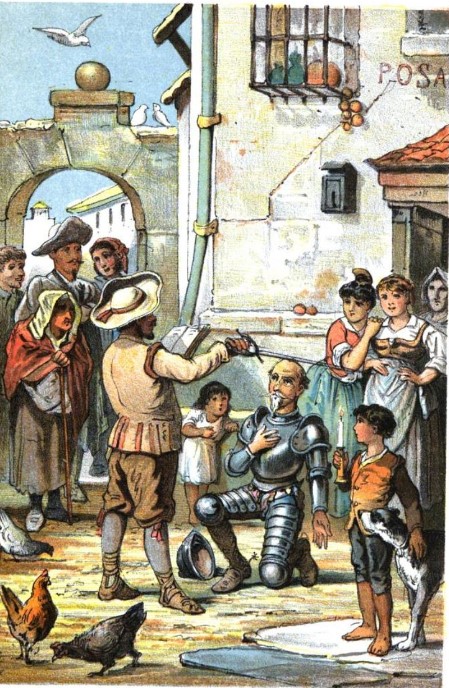
The Knighthood Don Quixote
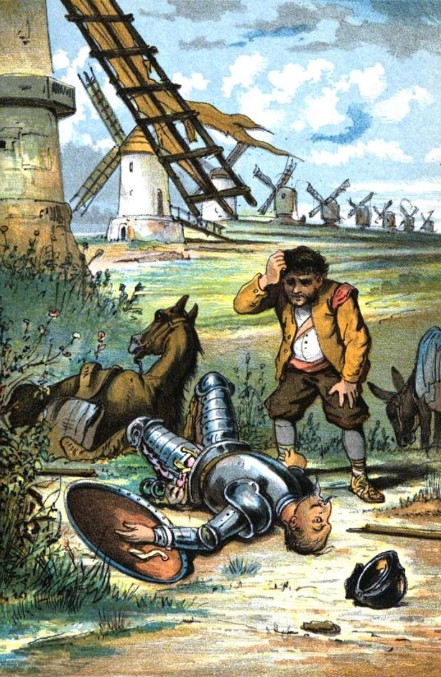
Delusional state Don Quixote
“Tilting at windmills” is a literary English idiom that means attacking imaginary enemies.
The expression is derived from the 1605 novel Don Quixote by Miguel de Cervantes, and the word “tilt” in this context comes from jousting or tilting: A combat or encounter (for exercise or sport) between two armed men on horseback, with lances or similar weapons, the aim of each being to throw his opponent from the saddle (OED).
Related idioms include going on a wild goose chase and chasing rainbows. All three phrases make the point that an objective is illusory, impractical, or impossible. As such, people who tilt at windmills, pursue wild geese or chase rainbows are frequently said to be ‘off/away with the fairies’ and ‘in a world of their own’!
“(You’re) fighting against the wind.” or “(You’re) Fighting the wind” This means that fighting is futile; has no point to it.
or
“Pissing against the wind.” When you piss against the wind, the wind blows your piss back on you. So, in some cases you’re fighting something that will just hurt yourself.
Pissing in the wind is stupid & futile. Tilting at windmills is noble but misinformed/delusional. The two do not equate
4 Fighting against the Beer Quay
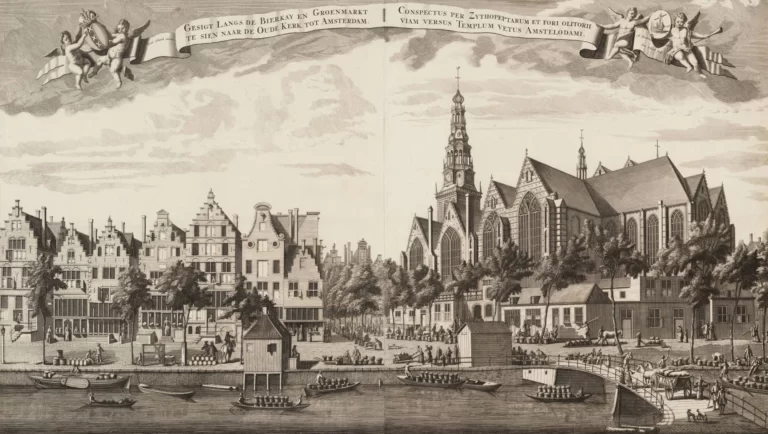
Fighting against the beer quay means attempting the impossible, engaging in a lost battle.
This expression originated in Amsterdam: beer quay is a colloquial term for the Bierkade. That was a part of the Oudezijds Voorburgwal, where barrels of beer were delivered and stored centuries ago. The porters were strong men and were known as real brawlers. Anyone who wanted to take them on could be certain in advance of losing the fight. As a result, fighting against the beer quay came to mean ‘doing something impossible, engaging in futile work.
Vechten tegen de bierkaai betekent ‘het onmogelijke proberen te bereiken, een verloren strijd aangaan’.
Deze uitdrukking is ontstaan in Amsterdam: bierkaai is een volkse benaming voor de Bierkade. Dat was een deel van de Oudezijds Voorburgwal, waar enkele eeuwen geleden vaten met bier werden aangeleverd en opgeslagen. De sjouwers waren sterke kerels en stonden bekend als echte vechtersbazen. Wie het tegen hen wilde opnemen, kon er bij voorbaat zeker van zijn de strijd te verliezen. Daardoor kreeg vechten tegen de bierkaai de betekenis ‘iets onmogelijks doen, nutteloos werk doen’.
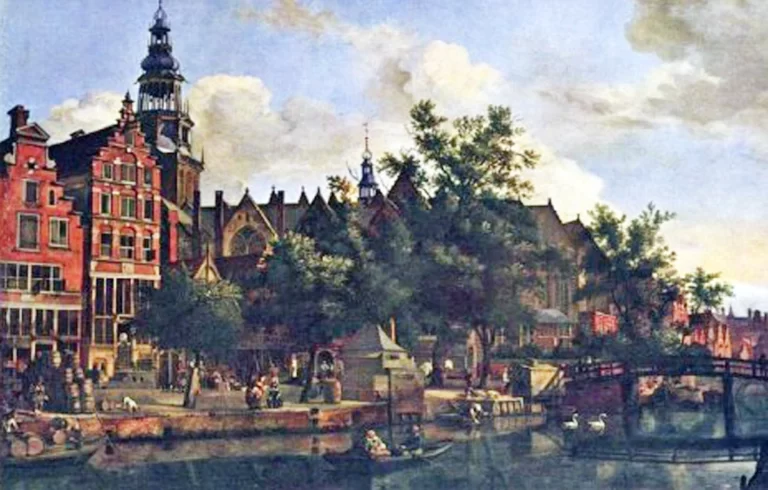
5 Confronting Regret and Seeking Justice
Ed Davey admits regret at not meeting Alan Bates sooner | LBC
Back to menu IMPORTANT CONTENT Listening recommended Must ***
1 feb 2024
In light of the ongoing controversy and recent broadcasts shedding light on the Post Office scandal, James O’Brien hears from former postal minister and Liberal Democrats Leader, Sir Ed Davey, who apologies for his role in the scandal.
Davey admits his regret at not meeting Alan Bates earlier and concedes he failed to uncover lies from the Post Office, specifically regarding the Horizon Computer System and remote access capabilities.
This apology comes after Bates described his compensation offer from the government as “cruel” and “offensive” – stressing that it’s only “around a sixth” of what he requested.
‘Somebody needs to be held accountable’: Family grieve sub-postmistress who died | ITV News
Back to menu IMPORTANT CONTENT Listening recommended Must ***
6 feb 2024
Of the hundreds of cases we know of those affected by the Post Office scandal, it’s hard to imagine anyone suffered as much as Fiona McGowan and her family.
Fiona actually had a proud track record of running successful businesses in the Edinburgh community.
At one point she had a picture postcard life in Musselburgh, on the east coast of Scotland, her petrol station business was thriving and her children grew up by the seaside surrounded by friends.
But in 2001, Fiona opened a post office and everything changed.
Here are the key points from the content of the video:
Apology from Ed Davey: Former postal minister and Liberal Democrats Leader, Sir Ed Davey, expresses regret for not meeting Alan Bates earlier in connection with the Post Office scandal.
Failure to Uncover Lies: Davey acknowledges his failure to uncover the lies from the Post Office, particularly about the Horizon Computer System and its remote access capabilities.
Bates’ Criticism: Alan Bates criticizes the government’s compensation offer, calling it “cruel” and “offensive.” He stresses that the compensation is “around a sixth” of what he had originally requested.
Context: This apology and conversation come in light of ongoing media coverage and broadcasts that are continuing to shed light on the Post Office scandal.
These points highlight Ed Davey’s regret, his acknowledgment of failures in addressing the scandal, and Alan Bates’ frustration with the inadequate compensation offer.
Here’s the Dutch version of the key points from the video:
Excuses van Ed Davey: De voormalige postminister en leider van de Liberal Democrats, Sir Ed Davey, uit zijn spijt dat hij Alan Bates niet eerder heeft ontmoet in verband met het Post Office-schandaal.
Mislukking om Leugens te Onthullen: Davey erkent zijn falen om de leugens van de Post Office te onthullen, met name over het Horizon Computersysteem en de mogelijkheden voor remote toegang.
Kritiek van Bates: Alan Bates bekritiseert het compensatieaanbod van de overheid, noemt het “wreed” en “offensief” en benadrukt dat het “ongeveer een zesde” is van wat hij oorspronkelijk had aangevraagd.
Context: Deze excuses en het gesprek komen in het licht van de voortdurende media-aandacht en uitzendingen die het Post Office-schandaal blijven belichten.
Deze punten benadrukken de spijt van Ed Davey, zijn erkenning van falen in het aanpakken van het schandaal, en de frustratie van Alan Bates over het ontoereikende compensatieaanbod.
‘Somebody needs to be held accountable’: Family grieve sub-postmistress who died | ITV News
Here are the key points from the content of the video:
Fiona McGowan’s Tragic Story: The video highlights the heartbreaking story of Fiona McGowan, a sub-postmistress whose life and family were deeply affected by the Post Office scandal.
Successful Track Record: Before her involvement with the Post Office, Fiona had a proud history of running successful businesses in Edinburgh, including a thriving petrol station, and her family had a picture-postcard life in Musselburgh, Scotland.
Life Changed in 2001: Everything changed for Fiona in 2001 when she opened a Post Office, which ultimately led to her and her family’s downfall.
The Grief of the Family: Fiona’s family is shown grieving, with a call for accountability for the devastating consequences of the Post Office scandal.
The Call for Accountability: The video ends with the statement that “somebody needs to be held accountable,” emphasizing the need for justice for those affected by the scandal.
This summary focuses on Fiona McGowan’s tragic journey from a successful businesswoman to becoming one of the victims of the Post Office scandal, along with the grief of her family and their demand for justice.
Here’s the Dutch version of the key points from the video:
Het Tragische Verhaal van Fiona McGowan: De video belicht het hartverscheurende verhaal van Fiona McGowan, een subpostmeesteres wiens leven en familie diep werden getroffen door het Post Office-schandaal.
Sucessvolle Achtergrond: Voordat ze betrokken raakte bij de Post Office, had Fiona een trots trackrecord van succesvolle bedrijven in Edinburgh, waaronder een bloeiend tankstation, en haar familie had een idyllisch leven in Musselburgh, Schotland.
Leven Verandert in 2001: Alles veranderde voor Fiona in 2001 toen ze een postkantoor opende, wat uiteindelijk leidde tot de ondergang van haar en haar familie.
De Rouw van de Familie: De familie van Fiona wordt getoond terwijl ze rouwen, met een oproep tot verantwoording voor de verwoestende gevolgen van het Post Office-schandaal.
Oproep tot Verantwoording: De video eindigt met de uitspraak “iemand moet verantwoordelijk worden gehouden,” wat de noodzaak van gerechtigheid voor de slachtoffers van het schandaal benadrukt.
Deze samenvatting richt zich op het tragische verloop van Fiona McGowan’s leven, van een succesvolle zakenvrouw naar een slachtoffer van het Post Office-schandaal, en de rouw van haar familie met hun eis voor gerechtigheid.
Post Office bosses should ‘beg for an apology’ – former subpostmistress’ husband
Post Office Scandal: Wrongly convicted pregnant sub-postmaster ‘collapsed’ following sentence
11 jan 2024 #politics #postoffice #uk
A wrongly convicted pregnant sub-postmaster has told Sky News she “collapsed” when she was handed a 15 month sentence.
Seema Misra was jailed while she was eight weeks pregnant.
She said: “Until that day [in court] I had faith in the system, I thought it will be all fine, why would I go to prison for a crime I never committed?
“But when th
6 Laughter in the Face of the Impossible
Young Japanese Girl Turns Into Old Man – Just For Laughs Gags
Cute, young, Asian girl is touring the city and needs help navigating. People passing by are happy to help out the pretty tourist, who is touting a massive backpack. But as soon as they look up from the map, she’s disappeared. In her place, mysteriously, is an old Japanese man wearing the exact same backpack. Prank victims look around for the girl they had just spoken to, but it seems that she’s magically transformed!